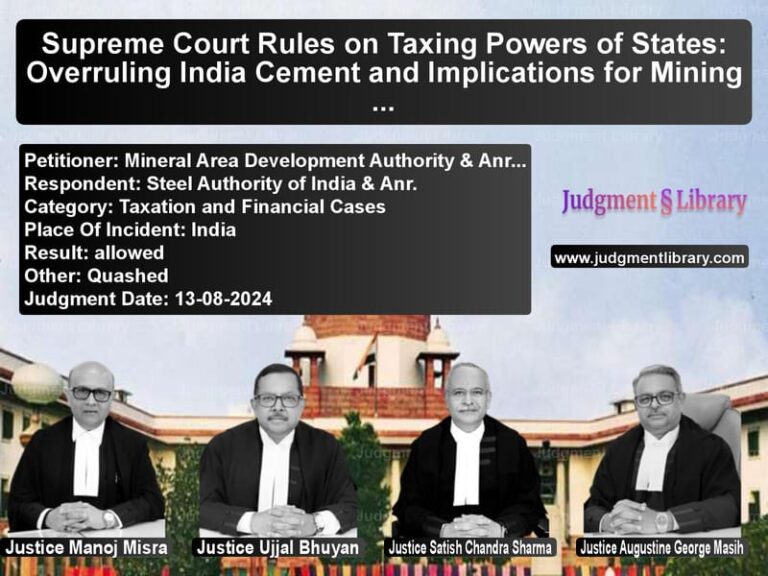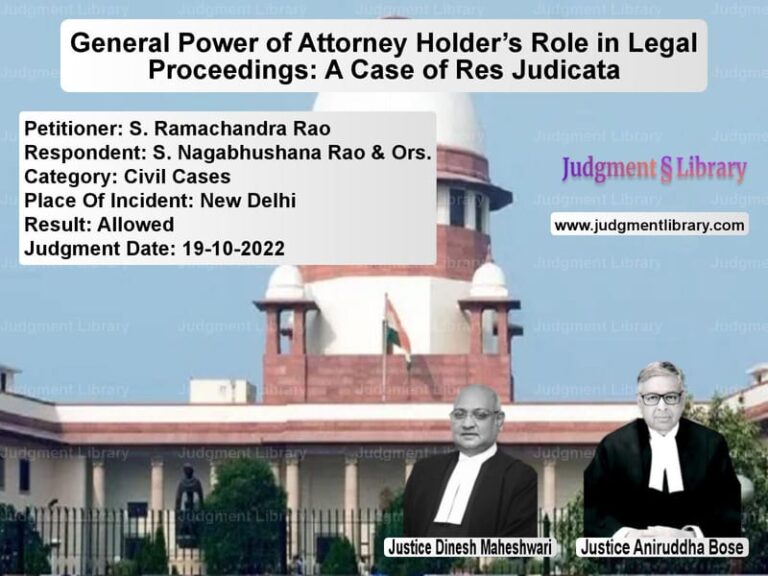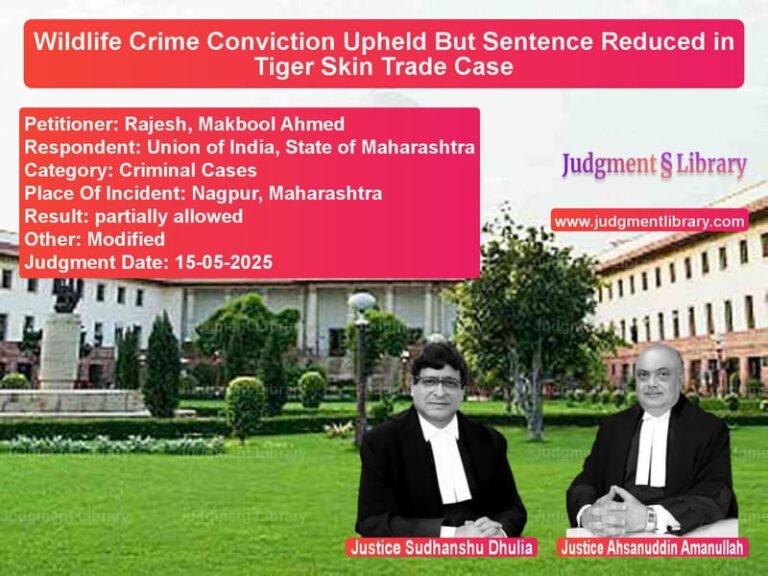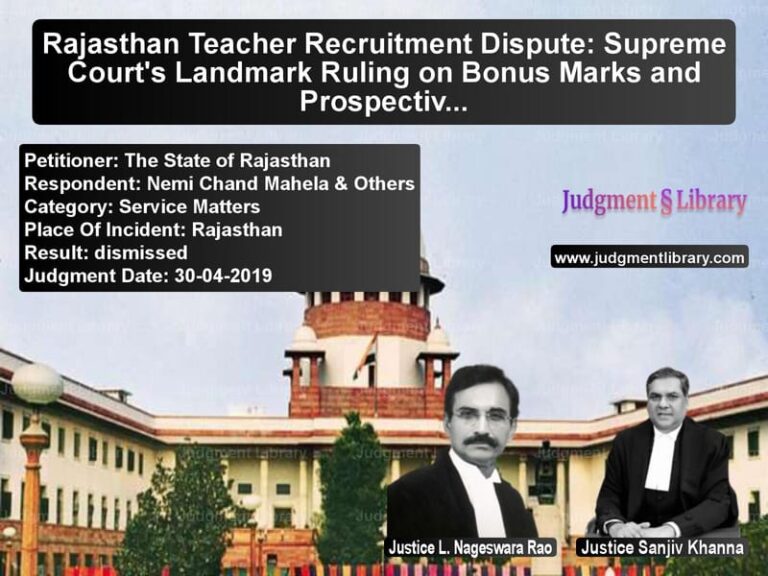Murder Conviction Upheld: Supreme Court Rules on Dowry Death and Dying Declaration
The case of Vijay Mohan Singh v. State of Karnataka revolves around a tragic case of dowry harassment and murder. The appellant, Vijay Mohan Singh, was convicted by the Karnataka High Court for the murder of his wife, Abhilasha, after initially being acquitted by the Trial Court. The Supreme Court, after carefully reviewing the evidence, upheld the conviction, emphasizing the reliability of the dying declaration and the prosecution’s case.
This case highlights the legal framework surrounding dowry-related offenses, the importance of dying declarations, and the limitations on appellate courts in reversing acquittals.
Background of the Case
Vijay Mohan Singh married Abhilasha on 11th December 2002 in Gurudwara Temple, Bidar. Before marriage, the accused and his family had demanded a dowry of Rs. 50,000 and five tolas of gold. The deceased’s family agreed to give six tolas of gold and domestic utensils.
Six months into the marriage, the accused and his family started demanding an additional Rs. 50,000 as dowry to invest in the husband’s electrical shop. When the deceased refused, she was subjected to both physical and mental torture. On 13th February 2005, the accused allegedly poured kerosene on Abhilasha and set her on fire, leading to her hospitalization with severe burn injuries. She passed away on 17th February 2005.
Her father lodged an FIR against the accused and four other family members, initially for offenses under Sections 498A, 307 IPC, and Section 4 of the Dowry Prohibition Act. After the victim’s death, charges under Sections 302, 304-B IPC, and Sections 3, 4, & 6 of the Dowry Prohibition Act were added.
Trial Court’s Verdict
The Trial Court, after examining 28 prosecution witnesses and two defense witnesses, acquitted all the accused. It rejected the dying declaration (Exhibit P-2) and held that the prosecution failed to establish dowry harassment beyond a reasonable doubt.
High Court’s Judgment
The Karnataka High Court, upon re-evaluating the evidence, reversed the acquittal and convicted the appellant under Sections 302 and 498A IPC and Section 4 of the Dowry Prohibition Act, sentencing him to life imprisonment with a fine.
Arguments by the Appellant (Vijay Mohan Singh)
- The Trial Court’s acquittal was based on a well-reasoned analysis, and the High Court erred in reversing it.
- As per established legal principles, if two views are possible, the one favoring the accused should be adopted.
- The dying declaration (Exhibit P-2) was unreliable as it was recorded on a printed form with corrections.
- The victim sustained 90% burns, raising doubts about her ability to provide a coherent statement.
- The kerosene stove and matchbox in the room did not catch fire, contradicting the prosecution’s claims.
Arguments by the Respondent (State of Karnataka)
- The High Court had the power to reappreciate evidence and correct the errors of the Trial Court.
- The dying declaration was recorded by a Magistrate and corroborated by independent witnesses.
- Medical evidence confirmed the victim was conscious and in a fit mental state when making her statement.
- The Trial Court ignored overwhelming evidence of dowry harassment and torture.
Supreme Court’s Observations and Ruling
The Supreme Court analyzed the admissibility and reliability of the dying declaration, stating:
- A dying declaration can form the sole basis of conviction if found trustworthy and voluntary.
- The statement made by the victim was recorded by a Metropolitan Magistrate (PW-28) in a question-and-answer format.
- The doctor certified that the victim was mentally and physically fit to make the statement.
- The victim explicitly named the accused and narrated how he poured kerosene on her and set her ablaze.
- The defense’s argument that the declaration was fabricated due to minor contradictions was dismissed.
Key Judgment Excerpt:
“The protection which is conferred upon the tenant against eviction, except on specified grounds, arises as a consequence of statutory prescription under rent control legislation. The reason why the tenant is entitled to occupy the premises beyond the lifetime of the landlord who created the tenancy is simply as a result of a statutory enactment.”
The Court found the High Court’s judgment to be valid and refused to interfere. It dismissed the appeal, upholding the conviction.
Conclusion
This ruling reinforces the importance of dying declarations in criminal trials, especially in cases of dowry-related deaths. It underscores that appellate courts have the power to overturn acquittals when the trial court’s reasoning is flawed. The judgment serves as a precedent in ensuring justice for victims of domestic violence and dowry harassment.
Petitioner Name: Vijay Mohan Singh.Respondent Name: State of Karnataka.Judgment By: Justice L. Nageswara Rao, Justice M.R. Shah.Place Of Incident: Bidar, Karnataka.Judgment Date: 10-04-2019.
Don’t miss out on the full details! Download the complete judgment in PDF format below and gain valuable insights instantly!
Download Judgment: Vijay Mohan Singh vs State of Karnataka Supreme Court of India Judgment Dated 10-04-2019.pdf
Direct Downlaod Judgment: Direct downlaod this Judgment
See all petitions in Murder Cases
See all petitions in Dowry Cases
See all petitions in Domestic Violence
See all petitions in Judgment by L. Nageswara Rao
See all petitions in Judgment by Mukeshkumar Rasikbhai Shah
See all petitions in dismissed
See all petitions in supreme court of India judgments April 2019
See all petitions in 2019 judgments
See all posts in Criminal Cases Category
See all allowed petitions in Criminal Cases Category
See all Dismissed petitions in Criminal Cases Category
See all partially allowed petitions in Criminal Cases Category







